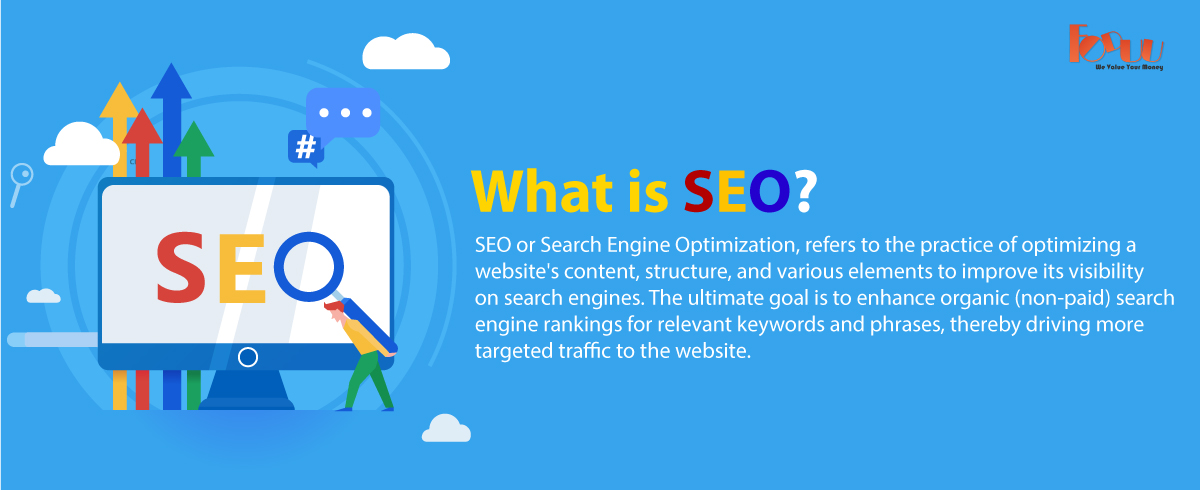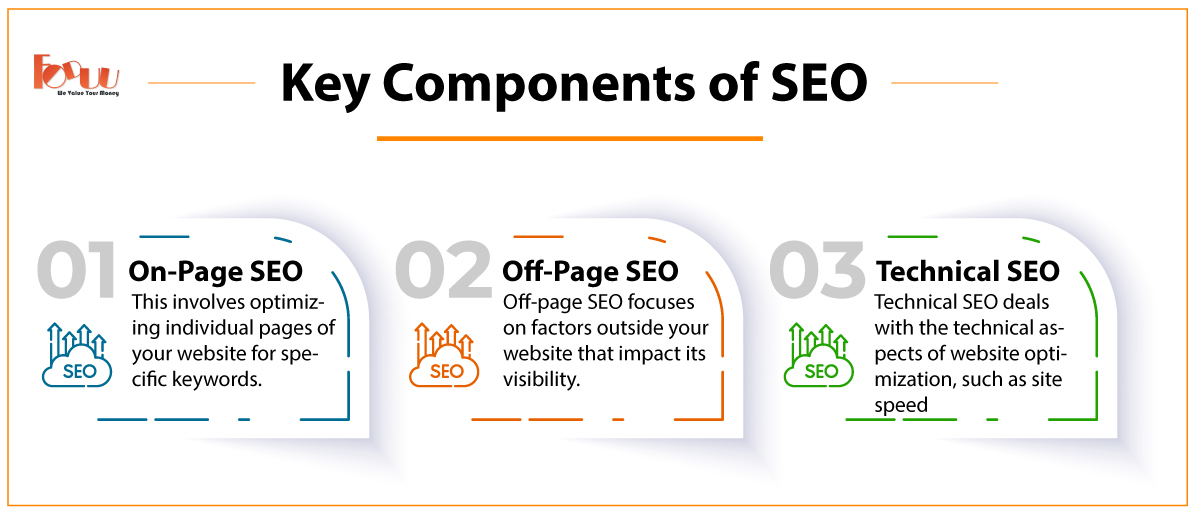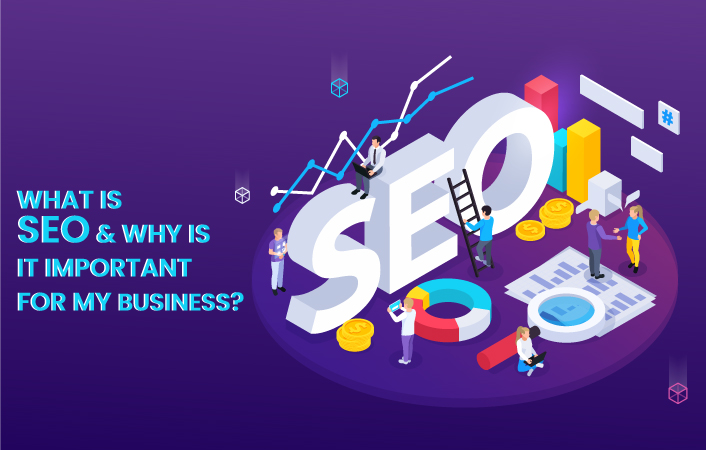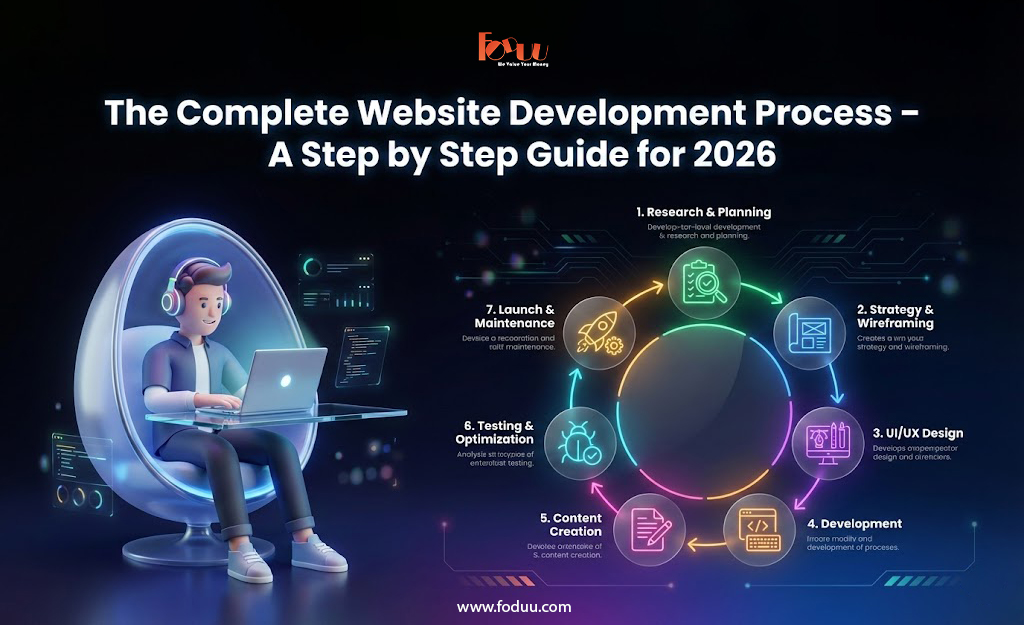In the ever-changing digital landscape, search engine optimisation (SEO) has become a critical component of a winning online strategy, as online exposure has the power to make or break a firm. This thorough tutorial seeks to explain the complexities of SEO and show why it is critical to the expansion and success of your company.
What is SEO?

SEO or Search Engine Optimization, refers to the practice of optimizing a website's content, structure, and various elements to improve its visibility on search engines. The ultimate goal is to enhance organic (non-paid) search engine rankings for relevant keywords and phrases, thereby driving more targeted traffic to the website.
Key Components of SEO:

1. On-Page SEO: This involves optimizing individual pages of your website for specific keywords. It includes optimizing content, meta tags, headings, and other HTML elements.
2. Off-Page SEO: Off-page SEO focuses on factors outside your website that impact its visibility. This includes backlinks from other websites, social media signals, and online reputation management.
3. Technical SEO: Technical SEO deals with the technical aspects of website optimization, such as site speed, mobile-friendliness, crawlability, and indexability.
Why is SEO Important for Your Business?
Understanding the importance of SEO is crucial for businesses aiming to establish a robust online presence and stay competitive in the digital marketplace. Let's delve into the key reasons why SEO is indispensable for your business success:
1. Increased Visibility and Traffic:
-
The Power of Search Engines:
Most internet activities start with a search engine. Google, being the most prominent, processes billions of searches daily. SEO ensures that your website appears in relevant search results, exposing your business to a vast audience actively looking for products or services you offer.
-
Organic Traffic:
Unlike paid advertising, where visibility ends once the budget is exhausted, SEO generates organic traffic that can continue over the long term. By optimizing your website for relevant keywords, you attract visitors genuinely interested in your offerings.
2. Credibility and Trust:
-
Trust Signals:
Websites ranking high in search results are often perceived as more trustworthy by users. SEO practices, including high-quality content, user-friendly design, and secure browsing experiences, contribute to building trust and credibility for your brand.
-
Establishing Authority:
Consistently producing valuable content and earning quality backlinks positions your business as an authority in your industry. This authority not only benefits your search engine rankings but also enhances your brand's reputation.
3. Enhanced User Experience:
-
Mobile Optimization:
Search engines give preference to mobile-friendly websites as the number of mobile users increases.SEO emphasizes mobile optimization, ensuring that users on various devices have a seamless and enjoyable browsing experience.
-
Fast Loading Speed:
Page speed is a crucial ranking factor, and it significantly impacts user experience. SEO involves optimizing images, minimizing code, and employing other techniques to improve website speed, keeping visitors engaged and satisfied.
4. Targeted Marketing and Relevant Traffic:
-
Keyword Optimization:
SEO involves in-depth keyword research to understand what terms potential customers are using to search for products or services. By optimizing your website for these keywords, you attract highly targeted traffic interested in what your business offers.
-
Local SEO:
Local SEO is essential for companies that have physical locations. It guarantees that your company shows up in local search results, which facilitates local clients' ability to locate and select your goods or services.
5. Cost-Effectiveness:
-
Organic vs. Paid Traffic:
Paid advertising has its uses, but in the long term, organic traffic from SEO is more economical. You can get continuous traffic to your website without spending money on advertising if it is well-optimized.
-
Higher ROI:
Investing in SEO for your business yields a High Return on Investment (ROI) because it targets users actively searching for products or services. The leads generated through organic search are often more qualified and likely to convert into customers.
6. Adaptability to Market Changes:
-
Algorithm Updates:
Search engines regularly update their algorithms to provide users with the most relevant and high-quality results. SEO allows your business to adapt to these changes, ensuring continued visibility and relevance in search engine rankings.
-
Evolving Trends:
The digital world is ever-changing, with new trends and technology appearing on a regular basis. SEO professionals stay informed about these changes, allowing your business to stay ahead of the curve and maintain a competitive edge.
7. Insightful Analytics and Data:
-
Tracking Performance:
SEO tools and analytics platforms provide valuable insights into your website's performance. You can track user behavior, popular content, conversion rates, and other metrics, allowing you to make data-driven decisions to enhance your online strategy.
-
Continuous Improvement:
By analyzing data and monitoring performance, businesses can identify areas for improvement. Whether it's refining keyword targeting, optimizing content, or enhancing user experience, SEO allows for continuous optimization and refinement.
8. Competition in the Digital Landscape:
-
Digital Market Saturation:
As more businesses establish an online presence, the digital marketplace becomes increasingly competitive. SEO becomes a crucial tool for businesses to stand out and ensure their offerings are visible to their target audience.
-
Global Reach:
Geographical restrictions can be overcome by enterprises through the use of SEO to reach a worldwide audience. SEO enables you to communicate with clients all around the world, regardless of the size of your company.
Conclusion:
In conclusion, SEO is not just a digital marketing strategy; it is the foundation of a successful website and business growth. The importance of SEO lies in its ability to increase visibility, credibility, and trust, enhance user experience, and drive targeted traffic to your website. For businesses aspiring to thrive in the competitive digital landscape, investing in SEO is not just an option; it is a strategic imperative that can propel your brand towards sustained success. By understanding and harnessing the power of SEO, your business can navigate the complexities of the online world and emerge as a prominent player in your industry.










